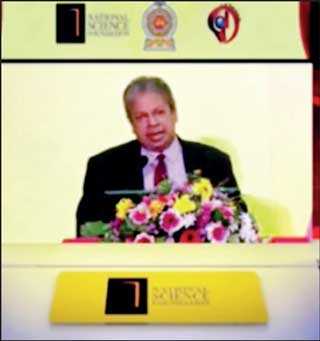Tuesday Feb 17, 2026
Tuesday Feb 17, 2026
Monday, 8 February 2021 00:28 - - {{hitsCtrl.values.hits}}

NSF Chairman Prof. Ranjith Senarathne addressing the gathering while Minister of Education, State Minister of Skills Development, Vocational Education, Research and Innovations, and the Additional Director of NSF are on stage
It was encouraging to see the National Science Foundation (NSF) has taken a timely move of organising a research conference on COVID-19. It was all about the impact, mitigation, opportunities and building resilience with a fitting theme ‘from adversity to serendipity’. The Postgraduate Institute of Management was so glad to be a strategic partner for this noteworthy endeavour and I was part of the steering committee of the conference, that was ably led by NSF Chairman Prof. Ranjith Senarathne.
organising a research conference on COVID-19. It was all about the impact, mitigation, opportunities and building resilience with a fitting theme ‘from adversity to serendipity’. The Postgraduate Institute of Management was so glad to be a strategic partner for this noteworthy endeavour and I was part of the steering committee of the conference, that was ably led by NSF Chairman Prof. Ranjith Senarathne.
Overview
The challenges associated with a hybrid conference where the technology had to play a key role was successfully overcome through a collective effort, in reaching out to a large number of Sri Lankan expatriates as well as local participants. According to the NSF, the main aim of the conference was to bring all the key players of the relevant public and private sector institutions under one roof to deliberate and reflect on the multiple aspects of the pandemic so as to build a robust and resilient community and economy in Sri Lanka.
Plans are underway to edit and publish the proceedings of the conference as a volume which will be valuable not only to Sri Lanka, but also to the rest of the world in coping with, and mitigating the impact of, such pandemics in the future. The NSF expects it to be a comprehensive and authoritative scholarly volume on how to manage a pandemic to minimise its economic, social, and psychological impact.
There were six specific objectives associated with the COVID-19 conference. First to collect, collate, systematise, analyse, interpret, and document information and data gathered on important aspects of the impact of and recovery from COVID-19. Second, to document lessons learnt, best practices and strategies identified, innovations achieved, and knowledge and experience gained in combatting the pandemic, mitigating its impact, and building resilience. Third, to determine and address needs in human capital development and capacity building to plan, prepare, manage, and recover in pandemic situations and build resilience. Fourth, to ascertain and address logistical deficiencies and inadequacies in infrastructure and competencies for developing effective and robust relief operations and supply chains in crisis situations. Fifth, to learn from failures and successes of other countries in combating COVID-19. Sixth, to formulate policies to combat any future epidemics and pandemics effectively with minimal impact and improved resilience based on lessons learnt.
It was indeed challenging to see the emergence of the second wave of COVID-19 in Sri Lanka that shaped the conduct of the conference, shifting from a much-desired success sharing to a more-realistic survival seeking. Yet, it was very much resonating with the original theme of adversity to serendipity. As NSF correctly observes: “While combatting COVID-19, a wide range of lessons were learnt, many best practices were identified, and new knowledge, insights, competencies, and experiences were gained. They ought to be further studied, refined, analysed, interpreted, and documented for the benefit of posterity. This should be done without delay lest a lot of the valuable information gathered, and the knowledge gained is lost forever.”
Prof. Malik Peris, the world-renowned virologist from University of Hong Kong made a virtual presentation highlighting the salient features of the planetary pandemic that we are experiencing and deliberated on the way forward in a comprehensive manner. He stressed the importance of effective communication in re-butting misinformation. He also highlighted the need to have better preparedness in combating novel viruses that may emerge in the future. There were many other eminent Sri Lankan expatriates representing North America, Europe, Oceania, and Africa also made insightful presentations.
 |
| Prof. Ajantha Dharmasiri addressing the hybrid session on the cross-cutting themes of Governance and Supply Chain
|
Variety of sessions
The conference dealt with the apt theme of moving from adversity to serendipity through a series of plenary sessions, tracks, cross-cutting themes, and a policy dialogue.
‘Strategies and interventions for building a resilient health sector’ was the title of the first plenary session chaired by Emeritus Professor Narada Warnasuriya. It covered a range of topics and featured many acclaimed medical specialists. The second plenary session covered the ‘Global experiences: Successes and failures in combating COVID-19’ which was chaired by Dr. Palitha Weerakoon. The third plenary session dealt with the ‘importance of indigenous medicine in combating COVID-19’, which was chaired by Dr. Senaka Pilapitiya. ‘Combating COVID-19 lessons learned and insights from North America’ was the topic for the fourth plenary session, chaired by Prof. Saroj Jayasinghe. Plenary session 5 was on ‘Building a resilient community and economy’, chaired by Dr. P.A. Kiriwandeniya.
Apart from the above, there was a panel discussion on ‘Education During Pandemic’, moderated by Dr. Chandra Embuldeniya. It featured Senior Prof. Sampath Amaratunga, Chairman, UGC, Dr. Upali Sedera, Secretary of the State Ministry of Education Reforms and Janaka Jayalath, Director, Tertiary and Vocational Education. The grand finale was a Policy Dialogue jointly moderated by Prof. Ranjith Senarathne and Prof. Dilanthi Amaratunga from the University of Huddersfield, UK. There were insightful presentations by panelists inclusive of Dr. W.A. Wijewardena, Shiran Fernando, Ceylon Chamber of Commerce, Dr. Susie Perera, Ministry of Health and Dr. Dushni Weerakoon, Institute of Policy Studies.
It was encouraging to see a wide array of research papers deliberated in six main tracks and cross-cutting themes. The main tracks included, health, mental health and wellbeing, economy, environment, building resilience and society. The cross-cutting themes included, governance, supply chain, research and innovations.
The health track co-chaired by Dr. Palitha Abeykoon and Prof. Saroj Jayasinghe was mainly to reflect on the ‘COVID-19 and the Sri Lanka health sector response: what we did and what we learnt from the pandemic’. The session involved the analysis of policy measures, strategies, plans, and actions adopted by Sri Lanka to prevent, mitigate, and control the pandemic. The session also explored the lessons we have learned from COVID-19 and propose health policy options and actions that could be taken to prevent such pandemics in the future.
The mental health and wellbeing track, co-chaired by Prof. Athula Sumathipala and Prof. Piyanjali de Zoysa was another insightful deliberation. As stated by the WHO, the coronavirus (COVID-19) pandemic has caused widespread concern, fear, and stress, all of which are natural and normal reactions to the changing and uncertain situation that everyone finds themselves in. Therefore, the mental health and psychological resilience during the COVID-19 pandemic should be better understood and addressed by individuals, communities, and governments.
Dr. Nishan de Mel co-chaired the track on economy. Described by some as the worst economic crisis in recent history, the pandemic extracts an economic toll at both micro and macro levels. These effects include weakened monetary and fiscal stability, reduced investment, diminished human capital, fragmented global trade, and a changed social contract. The effects are not limited to the short term, but will also have longer-terms consequences, which need to be anticipated. Reducing the pandemic’s immediate economic costs, safeguarding, and supporting the vulnerable, and setting a path for future economic advancement, requires a studied response.
Emeritus Prof. Sarath Kotagama and Dr. Chaminda Bandara chaired another crucial track on environment. According to the prior work by Prof. Kotagama, the environment should be recognised as consisting of three components, namely, natural, built and structured, and theoretical. Natural: all the elements into which the humans evolved, and thus it is those components that is left today with no human influence (most unlikely today). Built and structured: All the elements which humans have built or put in order materially – fields, buildings, roads infra-structures, etc. Theoretical: All subjects that make us what we are, health, education, culture, social, economics, etc. There were many relevant presentations.
‘Building resilience’ was another significant track co-chaired by Prof. Dilanthi Amaratunga and Dr. Nishara Fernando. As resilience building is a long-term journey, the track aimed to present and discuss the experiences in preparing for, responding to and efforts to recover from COVID-19. It also explored what we need to visualise as the new normal and how planning, preparing and recover from COVID-19, in a way that can strengthen the resilience of the society and the community while remaining vigilant about the ongoing pandemic.
Cross-cutting themes
The theme presentations on governance were co-chaired by Dr. Lloyd Fernando and me. I also co-chaired the presentations on supply chain together with Dr. Trevor Mendis. Prof. Ajith Alwis and Manju Gunawardena co-chaired the presentations on research, invention, and innovations.
The disaster such as the pandemic being experienced is a low probability, high impact event that threatens the viability of the social system that has an ambiguous cause, effect, and resolution. As such, a viable supply chain should be Agile to respond to the nature of demand at each phase; Lean to eliminate all types of waste during the supply linkages between producer and customer by getting earlier demand information to effectively match supply and demand; and Green to meet the standards of sanitation needed for consumption, particularly in a time of a pandemic. Hence, the research related to a Lean, Green and Agile Supply Chain for Food is of utmost importance. It can further be extended to cover areas other than food as well.
The response to COVID-19 has involved actions by all levels of government and other public bodies and agencies, especially those responsible for health, civil protection, education, and social issues. It has also rested on the frontline role of local authorities as those who are the closest to citizens and their needs. The effectiveness of the response to the COVID-19 emergency greatly depends on the level of coordination and cooperation between the different actors involved. It also depends on the active participation of civil society, as regards not only the respect of confinement measures but also the direct involvement in voluntary work aimed at sustaining the response effort. Hence the research related to governance aspects connected to COVID-19 will be timely and insightful. It can cover a wide array of topics ranging from democratic frameworks to delivery of people needs in a free and fair environment.
Way forward
As Aldous Huxley said a long time ago, “At the end of the day, what matters is not how much you know, but how much you have done.” This is much relevant to conference deliberations. The ideas should be translated into action producing results. Documenting the key knowledge for the access for appropriate applications is a vital start. I earnestly hope that the NSF initiative will truly lead from adversity to serendipity in meaningfully contributing to the curbing of COVID-19 for the betterment of humanity.
(Prof. Ajantha S. Dharmasiri can be reached through [email protected], [email protected] or www.ajanthadharmasiri.info.)